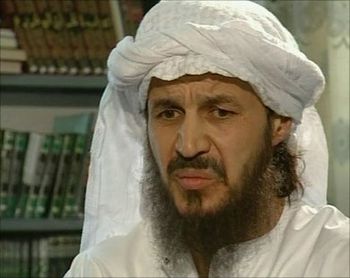
Jihad Ideologue Abu Muhammad al-Maqdisi Challenges Jordan’s Neo-Zarqawists
Publication: Terrorism Monitor Volume: 7 Issue: 20
By:

Salafi-Jihadi ideologue Abu Muhammad al-Maqdisi gave his first interview since his release from prison on March 12, 2008 to the Jordanian Muslim Brotherhood associated al-Sabeel weekly newspaper on June 4. Local media reported that security authorities in Jordan had set a condition that he would not give any press interviews after he was released. Al-Maqdisi’s interview comes in the shadow of increasing criticism directed at him by the neo-Zarqawists in Jordan (i.e. ideological followers of the late Abu Musab al-Zarqawi, former leader of al-Qaeda in Iraq), who accuse him of renouncing his jihadi ideology.
Several points were significant in al-Maqdisi’s interview. He told interviewer Wa’il al-Battiri he has not maintained that famous Salafi shaykhs such as Abdul Aziz bin Baz, Naser al-Din al-Albani and Muhammad Saleh al-Uthaymin were infidels, explaining that such accusations could be “due to certain strong expressions that I used against them.” (al-Sabeel, June 4, 2009). Answering al-Battiri’s question about the legitimacy of blowing up an entire building just to kill one or two soldiers, al-Maqdisi replied, “One should not be lenient about the sin of shedding the blood of Muslims based on suspicion, jihad, or other things. Indeed, the blood and property of disobedient Muslims cannot be violated, even if they commit iniquities. It is our duty to call them into religion and try to bring them from darkness to light and not to engage with them in battles. I have written on this many times and I dissociated myself from the undisciplined operations that others commit outside the bounds of Shari’a – operations that result in thousands of victims and in which much blood is shed without any legitimate benefits to jihad or Muslims.”
Furthermore, al-Maqdisi deplored the kidnapping of “neutral representatives of relief organizations who assist Muslims in many countries,” considering it “a crime that harms Islam and Muslims [and] the reputation of jihad and the mujahideen.” Al-Maqdisi denounced the unclaimed October 2003 bombing of the headquarters of the International Committee of the Red Cross [ICRC] in Baghdad; “I do not care who did it; rather, I care about advising Muslim youths in general, correcting their paths, and giving them the best choices. The ICRC is a neutral humanitarian relief organization. It has nothing to do with fighting Islam and Muslims.” Al-Maqdisi praised the ICRC for their support during his imprisonment.
Al-Maqdisi expressed his opposition on the targeting of churches and cinema houses. In response to al-Battiri’s question regarding targeting the Shi’a, al-Maqdisi said, “Despite the deviousness and false, deviant beliefs of al-Rawafid [the rejecters, i.e. the Shi’a], there are certain rules for holding them to be infidels, just like any heretics who also pray in the direction of Mecca. They cannot be held to be infidels collectively. One should distinguish between average Shi’is who do not know anything of their beliefs and who do not observe apostate practices, and the elite Shi’is who believe in the well known apostate ideas of their denomination… Therefore, we have deplored the bombing of Shi’i mosques because the mosques are places in which the ordinary man, woman, and child, as well as the elderly, sit and seek refuge. We also deplore targeting Shi’i women, children, and other non-combatants.”
Remarkably, al-Maqdisi’s answer concerning the Shi’a sparked the greatest criticism from the neo-Zarqawists who have campaigned against him in the last few years, although the criticism did not engage his religious insights. Instead they attacked him personally, describing him as “a brother of Shi’is” (www.almedad.com, June 5).
Apart from the growing rift between the neo-Zarqawists and al-Maqdisi, the latter showed in his answers a calmer tone than in the past (see Terrorism Focus, November 19, 2008). Analysts such as Muhammad Abu Rumman, chief editor of Jordan’s al-Ghad daily, found these answers closer to the “revisions” conducted in jihadi movements in Egypt that “were the golden key that extracted Egypt from the wave of mindless violence and incessant security worries” (see Terrorism Monitor, December 10, 2007; Terrorism Focus, April 30, 2008). Maqdisi’s comments and the Egyptian “revisions” indicate the importance of cultural, intellectual, and legal dialogue as a “preventive solution" in countering "Islamic radicalism" (al-Ghad, June 15).
It is important to note that the “calm” or soft tone of al-Maqdisi has dual implications; on the one hand it will play a major role in preventing young people from joining the radical neo-Zarqawist generation. On the other hand it is important to note that al-Maqdisi has not denounced jihadi ideology in general, only certain aspects of it. There is a major difference between what he is presenting and the revisions the Egyptian jihadis issued; the Egyptians laid considerable emphasis on the importance of “peaceful political engagement,” while al-Maqdisi has not approached this idea yet. Despite this, al-Maqdisi’s views will inevitably appear to be “moderate” in comparison with those of Jordan’s neo-Zarqawists.
Such a situation could lead to increasing competition between the two parties over legitimacy and the authentic representation of the Salafi-Jihadi movement. The rift between al-Maqdisi and the younger neo-Zarqawists can be expected to widen.





